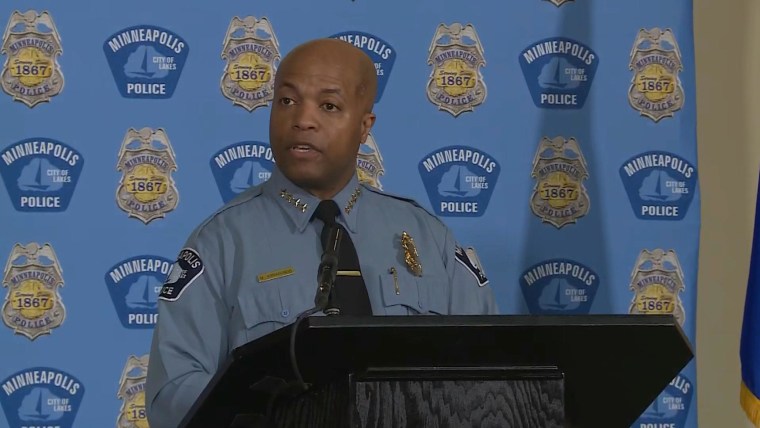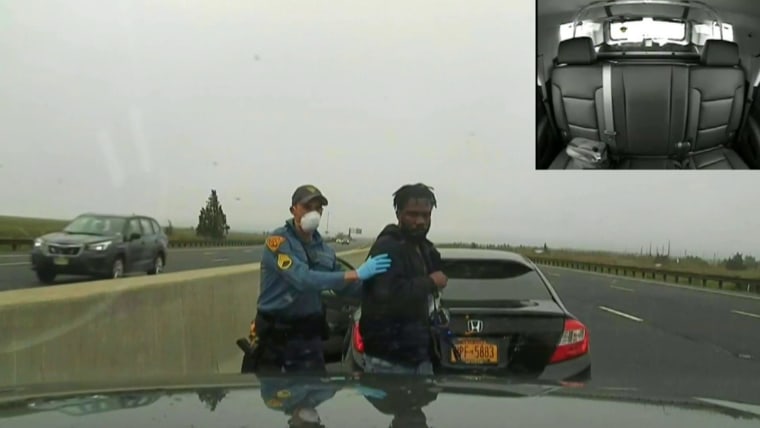Shortly after four Minneapolis police officers were fired over the death of George Floyd, the president of the city's police union wrote a letter to his members signaling that he was working to restore the officers' jobs.
"They were fired without due process," wrote Lt. Bob Kroll, of the Minneapolis Police Federation.
Kroll's union has had great success in getting police officer terminations reversed — by appealing them to arbitrators.
Since 2006, eight Minneapolis police firings have been decided by arbitrators and all but two resulted in the officers getting their jobs back, according to an NBC News review of records from the Minnesota Bureau of Mediation Services.
One officer punched a handcuffed man in the face multiple times, breaking his nose.
Another pleaded guilty to a misdemeanor charge stemming from an altercation with his wife.
A third, Jason Andersen, was fired, reinstated, then fired again after a new incident of allegedly kicking a teenager in the head. That still didn't end Andersen's career — an arbitrator went on to reinstate him for a second time.
"That case might be more egregious than most, but it's not at all far-fetched in the world of law enforcement labor," said Andy Skoogman, executive director of the Minnesota Chiefs of Police Association. "It's maddening, and the general public should be outraged."
The Minneapolis police union did not respond to a request for comment on its current stance on the officers.
Minneapolis is among many municipalities across the country where union labor agreements and state employment laws make it difficult to fire police officers.
The issue has come under fresh scrutiny in the wake of Floyd's killing. The 46-year-old Black man's death in police custody has focused attention on a wide range of policing matters, including the lack of a national registry of officer misconduct and the obstacles in disciplining problem cops.
Experts say arbitration plays an outsized, and often overlooked, role in saving the jobs of officers accused of serious misconduct.
"I would say this is one of the most important accountability issues," said Stephen Rushin, a Loyola University Chicago law professor who published a study on arbitration in 2018.
"If you can't remove bad officers, it's going to be really hard to improve a police organization."
In Minnesota, as in many other states, members of public employee unions have the right to appeal any form of discipline to binding arbitration.
The process of selecting the arbitrators in most places is akin to picking a jury.
Presented with a pool of seven, each side takes turns striking a name until only one remains.
The arbitrator will then hold a closed-door hearing and accept written briefs. A ruling is typically made within 30 days and could amount to upholding the discipline, reducing it or throwing it out entirely.
Some experts say the selection of arbitrators incentivizes them to rule half the time in favor of the unions and the employee and half the time in favor of the employers in order to keep getting chosen.
Studies done on the Minnesota arbitration system back up part of the claim: The rulings on police firings since 2006 split just about down the middle.
Stephen Befort, an arbitrator and authority on labor law, said it makes sense that arbitrators would maintain close to an even record given the complexity of the cases. "The cases that come to arbitration tend to be the difficult ones," said Befort, a University of Minnesota law professor.
Most arbitrators are lawyers who specialize in labor issues, Befort said. But their ranks also include human resources professionals and business managers.
Dave Bicking, a former member of the Minneapolis Civilian Police Review Authority, said he believes the problem lies not with the arbitrators, but with police departments' history of doling out discipline in an inconsistent fashion.
"Anytime the police department tries to discipline someone, the union can come up with a half-dozen cases of someone who did worse and got no discipline at all," said Bicking, who is now a board member of the Minneapolis-based advocacy group Communities United Against Police Brutality. "What do you do now? You can't ever discipline anyone because you've never disciplined anyone. It's a Catch-22."
The Minneapolis police union says only a small number of cases go to arbitration — roughly two a year — and it rejected the "false narrative that our union defends any officer for any reason."
"The system of workplace justice — which is closely akin to our criminal justice system in many respects — requires that all public employees, even police officers, have the opportunity to contest discipline before a neutral third-party," Sherral Schmidt, vice president of the Minneapolis Police Federation, said in a statement to reporters issued Tuesday.
The most recent Minneapolis case involves Officer Peter Brazeau, who was fired in February 2019.
Brazeau was caught on camera in 2016 repeatedly punching the face of a drunken man who was handcuffed and lying on his back.
The victim had been acting belligerently at a bar and had kicked Brazeau while handcuffed, according to an arbitrator's report.
"Then, I placed my knee on his chest and delivered three to four strikes to his face," Brazeau told an internal affairs officer, the report says.
The victim suffered a broken nose and other facial injuries, according to the report.
The arbitrator overturned the termination and instead ordered a two-week suspension.
In his ruling, the arbitrator cited the fact that Brazeau was placed on leave following the incident but was then brought back as a training officer prior to his termination.
"This pre-discharge experience cannot be ignored," the arbitrator wrote. "It does indicate that [Brazeau] has the ability to handle a police officer's duties and responsibilities."
Derek Chauvin, the Minneapolis police officer seen on video pressing his knee on Floyd's neck for nearly eight minutes, has been fired and charged with second-degree murder, third-degree murder and manslaughter. Three other former officers — Tou Thao, J. Alexander Kueng and Thomas Lane — were charged with aiding and abetting second-degree murder and manslaughter.
A criminal charge — and even a guilty plea — does not automatically preclude an officer from being reinstated.
Officer Mukhtar Abdulkadir was fired in 2011 after he was charged with felony assault for an alleged attack on his wife. She told police he punched her in the abdomen and hit her with the butt of his gun, an arbitrator's report says. But she later recanted, and Abdulkadir pleaded guilty to a misdemeanor disorderly conduct charge.
An arbitrator ruled in favor of the officer and reduced his punishment to a 30-hour suspension, citing a flawed investigation into the incident.
Then there's the case of Jason Andersen.
He was fired in 2009 after he got into a fight with his girlfriend that resulted in a misdemeanor assault charge. She ultimately recanted, and the charge was dismissed.
An arbitrator ordered him reinstated after concluding there was insufficient evidence to support the assault allegation.
Andersen was fired again in 2010 for allegedly kicking a youth in the head and body during an arrest — and then lying about the incident. But an arbitrator once again agreed with the union and reduced the termination to a two-month suspension. The arbitrator concluded that Andersen couldn't be expected to get all the details right when questioned a year after the incident.
Andersen, Abdulkadir and Brazeau are all still working for the Minneapolis police department, a spokesman said. Abdulkadir and Brazeau could not be reached. A message left for Andersen was not returned.
Of the two firings that were sustained by arbitrators, one was an officer who attacked his wife and had a history of abuse toward women. The other was convicted of disorderly conduct and possession of a pistol while drunk.
An arbitrator upheld that officer's termination not because of the conviction itself, but because of the punishment that came with it: He was barred from carrying a firearm for one year.
The officer "lost the ability to carry a firearm and contemporaneously lost the ability to carry out essential job requirements," the arbitrator ruled.
Efforts to reform the arbitration system are complicated by the fact that it applies to all types of public sector union members including teachers and firefighters. Arbitration is designed to relieve the burden on courts and provide faster resolution to cases. The system can act as a check on department heads who may make discriminatory personnel decisions, but some experts say there's a case to be made for applying different standards to police officers.
"One officer can create substantially more harm to society than one bad teacher," Rushin said.
In its statement, the Minneapolis police union pointed to research showing that arbitrators uphold police firings at roughly the same rate — just over 50 percent — as other types of employees.
Skoogman, of the Minnesota police chiefs association, said those statistics reinforce his point that the system is flawed.
"Imagine running any business and you have to allow 50 percent of the people you've fired to come back in and work in your business," he said.
"It sends the completely wrong message that you can do whatever you want and you're not going to get fired," Skoogman added.
Kroll, the Minneapolis police union leader, did not respond to a request for comment.
In media interviews this past week, he suggested Chauvin's firing was justified but stopped short of criticizing the other officers present at the scene.
"Right now, we cannot make an informed decision regarding the other officers that do not appear on camera," Kroll said on "CBS This Morning."
Bicking, the former member of a civilian police review board, said he believes "it's very likely" the officers would be reinstated if the union opts to defend them, but the opportunity may never come depending on what happens in court.
"The question is, will they be convicted?" he said.
"how" - Google News
June 27, 2020 at 05:03PM
https://ift.tt/2BHEEE7
How the officers charged in George Floyd's death could get their jobs back - NBC News
"how" - Google News
https://ift.tt/2MfXd3I
https://ift.tt/3d8uZUG
Bagikan Berita Ini
















0 Response to "How the officers charged in George Floyd's death could get their jobs back - NBC News"
Post a Comment